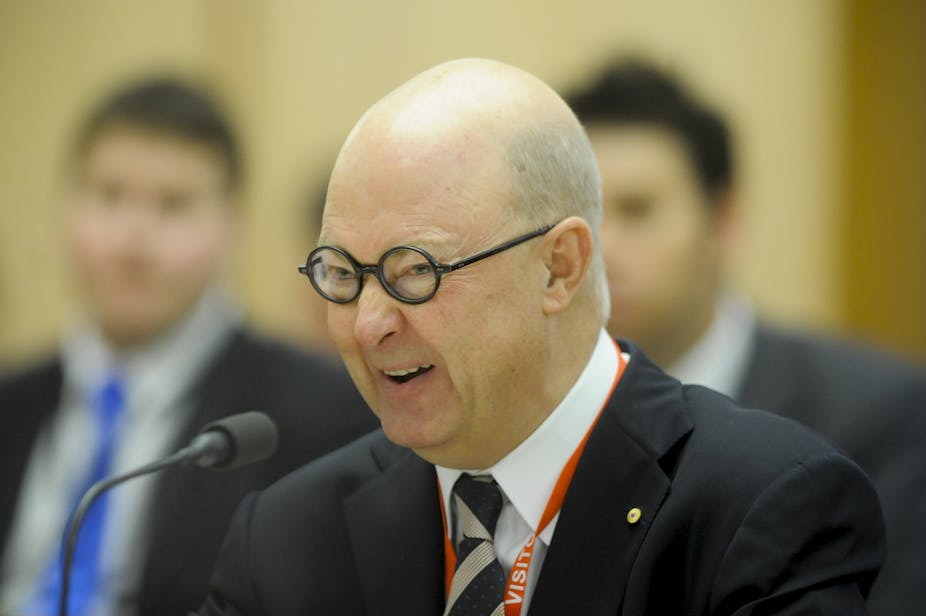The first week of what is shaping up to be a great election campaign ended as it began – with the media at the forefront of the agenda. Rupert Murdoch’s News Corp Australia has been firmly in focus all week, and the media company this morning announced the departure of its chief executive, Kim Williams.
The last time Rupert Murdoch lost a CEO in such a dramatic manner was when his son James resigned from his UK job as chairman of News International, forced out by the fallout from the phone hacking scandal and the very real possibility that he could face prosecution in Britain and the US for corporate bribery of public officials and other offences. James Murdoch’s resignation was a sacrifice to the cause of damage limitation in the hugely important US market, as was the closure of the News of the World, where the scandal began.
Kim Williams’ resignation has very different roots, of course, but confirms the depth of the management dysfunction now afflicting the Murdoch empire. At the end of a week in which News has been heavily criticised for its brazenly biased coverage of the election, the CEO of the company resigns. This in the wake of the arrival of hardman Col Allan to provide “additional editorial direction” – News-speak for ensuring that the boss’ desires be implemented fully.
Not that Williams was a pussycat in management terms. According to one report today there was a “good Kim and a bad Kim”; he is a man with a “volcanic temper”; a “genius” but a “complicated” character. But he was not the typical News manager, being something of an intellectual, and not especially comfortable with the idea of fronting the corporate vehicle for a propaganda campaign against the ALP. The arrival of Col Allan to whip him into line seems to have been the trigger for today’s announcement, which comes at the worst possible moment for the company.
This display of executive disunity, at the outset of a campaign in which News titles have already been placed under scrutiny for their ideologically committed approach, draws more attention to their motives and agendas. If a seasoned manager like Williams can’t stand the heat, what on earth must the rest of the staff be thinking right now - those, that is, who don’t willingly buy into the “Rudd bad/Abbott good” frame being pursued by News?
Williams was someone who, while addressing quite ruthlessly the need for digital transformation of News’ business, also wished to keep the Australian branch free of the taint of the UK phone-hacking scandal. He sought to address the perception in Australia that News had become simply a Murdoch family mouthpiece, and to stress the importance he placed on quality journalism. He condemned former communications minister Stephen Conroy’s proposals for reform of Australian press journalism after the Finkelstein review (as did many of us not in receipt of the Murdoch dollar), but he also gave the impression of understanding where the pressure for reform was coming from.
Williams’ management style and editorial approach were not those of a Col Allan, or Williams’ predecessor John Hartigan, or former editor of The Sun Kelvin MacKenzie in the UK, by which I mean unapologetically confrontational, populist and loyal to the boss. With Allan’s high profile and humiliating arrival, Williams appears to have decided that he was fatally compromised at News Corp Australia.
So this is an extraordinary end to an extraordinary week, in which issues of media bias and tone – and the relationship between media, democracy and power - have been consistently at the top of the news and campaign agendas.
As a longstanding observer of the UK scene where, until the phone hacking scandal broke, News got away with the most outrageous political coverage for decades - challenged only by the left and some in the academic world - I think this is a good way to start an election campaign.
There has been a lot of debate this week about how important News’ ferocious coverage of the ALP will be in shaping the election outcome, and how important mainstream media are in the digital news environment. What we can say with some confidence is that the capacity of any media organisation to influence public opinion is inversely proportional to the degree of scrutiny and transparency which surrounds its activities.
For the moment at least, News is the story of the campaign, and not in a good way. Nothing it prints, posts or broadcasts about the competing programs on offer in 2013 can be read free of the highly illuminating context this week’s events have provided.

